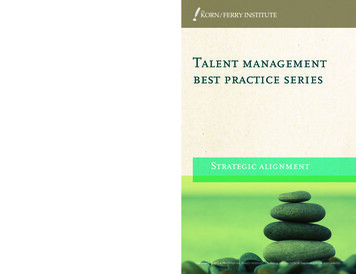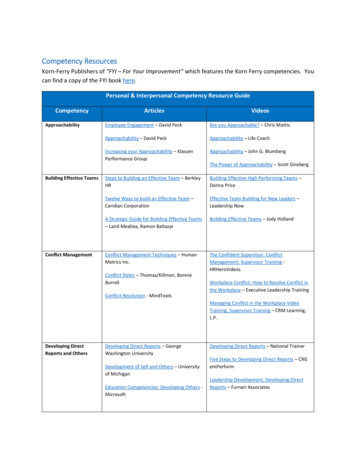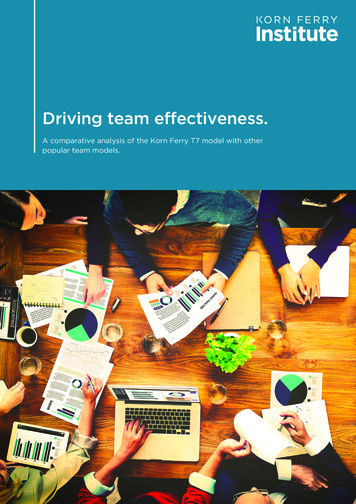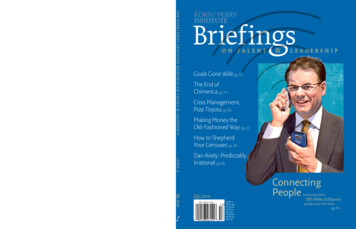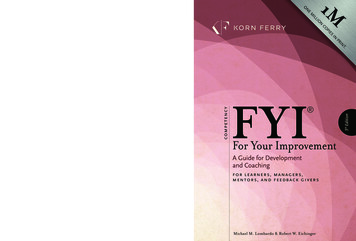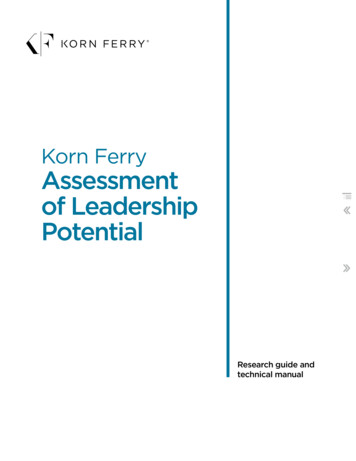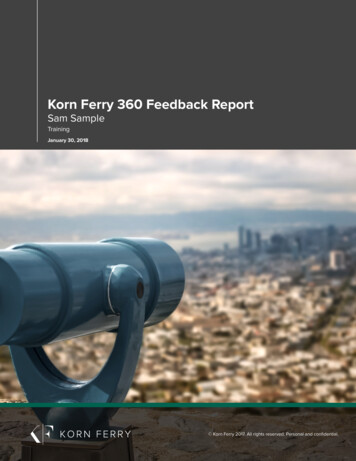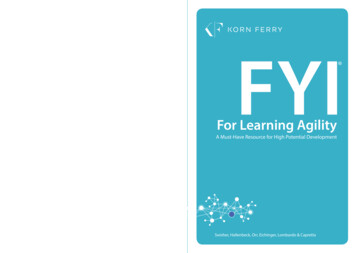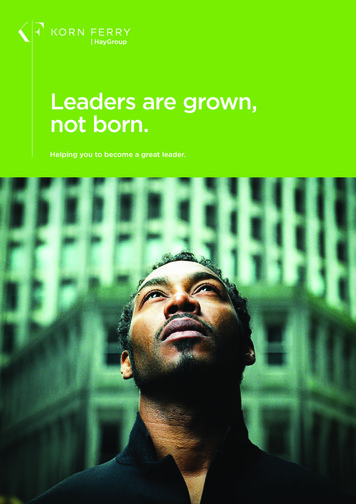
Transcription
DanarielyPredictablyIrrationalBy Glenn Rifkin46Q3.2010T h e K o r n / F e r r y I n s tit u t e
profileBecoming a star in the controversial academicdiscipline of behavioral economics is not for the faint of heart.Battle lines were drawn nearly four decades ago when innovative thinkers such as Daniel Kahneman, Amos Tversky and Richard H.Thaler challenged traditional economic dog ma with theirtheories about the unpredictable impact of human behavior on tried-and-true economic models.Treading on the sacred ground of mainstream economics set off an intense controversy and interand intra-disciplinary sniping that has continued unabated ever since.For Dan Ariely, a behavioral economist at Duke University’s Fuqua School of Business andauthor of the best-selling “Predictably Irrational: The Hidden Forces That Shape Our Decisions”(Harper, 2008), a little testy debate about his work pales incomparison to his own remarkable odyssey. An Israeli whowas born in New York City but raised in Ramat HaSharon,a small city just north of Tel Aviv, Ariely welcomes combative discourse with the relish of someone who has enduredtougher battles.When Ariely was 18, just after he had joined the Israelimilitary, he was at a meeting in a room filled with muni-noticed a table set up with a big sign offering “Onechocolate per customer.” At the table, you were givena choice: a high quality Lindt chocolate truffle for 15cents or a Hershey’s Kiss for one cent. What wouldyou take? In the experiment, customers made a very“rational” choice. About 73 percent chose the betterLindt truffle while 27 percent bought the Hershey’stions when a magnesium flare, the kind used to light upKiss. But suppose you came back the next day and thebattlefields at night, inexplicably ignited. The explosionprice had changed. Now, the Lindt is 14 cents and theleft him severely burned over 70 percent of his body.Hershey’s Kiss is free. Would you expect a differenceAfter an agonizing three-year hospital stay, countlesssurgeries and skin grafts and a painful struggle to heal, Ariely re-entered a world that had become alien and inaccessible. He had to relearn the mundane aspects of life, like howIllustrations by John Uleland. Dan Ariely photos by Forrest MacCormackSuppose you walked into a large public building andto step into a bath and to reconnect as a social being. Instead of succumbing to self-pity, he returned to academiaand discovered the initial precepts of his career. Today, the43-year-old Ariely retains what he describes as his Israelicombativeness, along with a wry sense of humor and unflappable balance. His ordeal fueled a deep introspectionin customer reaction? Should there be? In fact, 69 percent of the customers chose the Hershey’s Kiss whenit was free, and the Lindt buyers dropped to 31 percent. The 14 cent price difference had not changed,but “free” made all the difference. It created a struggle in making a decision and led the customers tomake a bad decision, giving up what they actuallypreferred for something inferior. It was irrational buthardly unexpected. It happens all the time. —A sample experiment conducted by Dan Arielyabout his own psychological makeup and a fascination with why people behave as they do.Traditional economists dismiss Ariely’s work and that of other behavioral economists asinconsequential trivia — clever lab experiments that do not apply to the real world of finance andpolitics. But, Ariely believes that the economic meltdown in 2008 and former Federal ReserveBoard Chairman Alan Greenspan’s confession that he had been wrong about the rationality ofmarkets vindicate his life’s work. If Ariely is an expert on anything, it is irrational behavior.B r i e fi n g s o n T a l e n t & L e a d e r s h i pQ3.201047
Ariely first confronted irrational behavior during his prolonged stay in theIsraeli hospital. The bandages and dressings covering his badly burned bodyrequired daily changing. The nurses insisted that the correct and least painfulprocedure was to rip the bandages offquickly — much as a parent removes achild’s Band-Aid — starting with themost damaged area and moving to theleast affected spot. But in Ariely’s case,this hourlong process was torture andhe quickly grew to dread it. He believedthat a slower, gentler bandage removalwould be far less excruciating eventhough it would take twice as long. Thenurses refused to believe him.Later, when he had finally left thehospital and entered Tel Aviv University,Ariely took a class on the physiology ofthe brain taught by Hanan Frenk, whobecame an early mentor. With Frenk’sguidance, Ariely designed and conducteda series of experiments using heat, coldwater, pressure from a vice grip, loudnoises and the like to determine howpeople reacted to pain. When he finished,he had evidence that he had been correctand that the nurses in the hospital hadcome to an irrational conclusion andhad been wrong.Although Ariely returned to the hospital and explained his research to thenurses, they politely refused to changetheir methods. But for Ariely, the experience was cathartic. It “profoundlychanged my outlook on research andlargely determined my future,” he wrote.More than anything, Ariely’s experiencetaught him to question what was presumed to be fact and to pursue evidenceto support his conclusions. He becameenthralled with experimentation andfrom that point on relied on empiricalinformation to shape his thinking. Hesat for hours in coffee shops and observedpeople and their behavior.Now, with a doctorate in psychology and a second doctorate in businessadministration, Ariely, a determinediconoclast, retains an insatiable curiosity about what motivates people. In an48Q3.2010irrational world, a rational man may beking, but Ariely believes that irrationalbehavior is not only predictable but alsopotentially profitable for open-minded,innovative thinkers in business, politicsand other facets of life. He enjoys passionate debate nearly as much as thecountless experiments he has conductedfor his academic research. Meanwhile,his best-selling book has catapulted himinto the international spotlight.The book describes dozens of experiments Ariely conducted over thepast decade with colleagues and graduate students, mostly during his years atthe M.I.T. Sloan School of Managementand in other appointments atPrinceton and the University of California,Berkeley. His experiments are an eclecticmix, scrutinizingeverything from online dating to the origins of unethical behavior. He makes extensive use of studentbodies by enlisting them in a varietyof empirical studies. For example, hetested the placebo effect created byhigh-priced brand name aspirin versusa cheap store brand among students. Hecaused a stir with an experiment on sexual arousal that tracked the increasinglyirrational state young men reach as theyget more and more aroused during masturbation. Ariely believes that issuessuch as teen pregnancy, date rape andthe spread of H.I.V. and AIDS can be better understood if we predict how someone behaves when sexually aroused.Ariely has been spotted slippinginto dormitories or working in disguiseas a server in a bar, all in the name of social science. He once sneaked into a dormitory at the Massachusetts Institute ofTechnology and deposited several sixpacks of Coca-Cola in refrigerators incommunal areas on each floor. He surreptitiously monitored the refrigeratorsand discovered that within 72 hours, allthe Coke was gone. Next, he placed aplate containing six one-dollar bills ineach of the same refrigerators andwaited. After 72 hours, not a single dollar had been taken.Ariely concluded that people arecomfortable cheating or stealing whencash is not directly involved. “Companies cheat with their accounting practices, executives cheat by using back-dated stock options, lobbyists cheat byunderwriting parties for politicians,” hewrote. As long as people can keep somedistance from taking actual cash, theycan somehow justify dishonest behavior. This can explain a great deal aboutthe rash of corporate malfeasance in thepast decade. The leaders of Enron wouldnot have mugged old ladies with blackjacks and taken money from theirpurses, but they were able to rationalizeT h e K o r n / F e r r y I n s tit u t e
destroying the retirement savings oftens of thousands of employees and investors, Ariely noted.Given that traditional economistsfailed to predict or explain the events ofthe past three years, Ariely is convincedthat behavioral economics is the correctapproach for understanding and addressing global economic challenges.“As the results presented in thisbook show, we are all far less rationalin our decision making than standardeconomic theory assumes,” Ariely writes.“Our irrational behaviors are neitherrandom nor senseless — they are systematic and predictable. We all makethe same types of mistakes over andover, because of the basic wiring of ourbrains. So wouldn’t it make sense tomodify standard economics and moveAriely has beenIt is always, What’s next?’ A lot of academics get stuck working on the samething. Dan is always looking for a way tomove things forward.”Ariely has become a much soughtafter expert amid the current enthusiasm for behavioral economics. He waspart of a dream team of behavioral scientists and economists, including Kahneman, Thaler, Cass R. Sunstein andRobert B. Cialdini, that advised BarackObama about fighting negative advertising, soliciting campaign contributions and getting out the vote duringhis presidential campaign. And, Ariely’sbook is one of several behavioral science-based business best-sellers, also including “Freakonomics,” “Nudge” and“The Wisdom of Crowds,” that has challenged mainstream economic thinking.His follow-up book, “The Upside of Irrationality: The Unexpected Benefits ofspotted slipping into dormitories or working in disguise asa server in a brewhouse, all in the name of social science.away from naïve psychology, which often fails the tests of reason, introspection and empirical scrutiny?”To promote empiricism, Ariely hasdedicated his life to experimentation.He is happily married and has two smallchildren, but he has little time for outside interests. “I used to be a more interesting guy with hobbies, like flying aplane and scuba diving,” he said. “Butacademia really takes over everything. Ihave many more ideas for experimentsthan time to do them.”Michael I. Norton, an assistant professor of marketing at Harvard BusinessSchool, did his postdoctoral work atM.I.T., where Ariely was his advisor.“You could go to his office and say, I ran100 experiments, published 20 papersand wrote 10 best-selling books’ andhe’d pause and reply, ‘What else?’” Norton said. “He also applies that to himself. What else can I do? What are theinteresting questions, who are the otherpeople I could work with and talk with?’B r i e fi n g s o n T a l e n t & L e a d e r s h i pDefying Logic at Work and at Home,” isjust arriving in bookstores.For Ariely, his core argument isstraightforward.“Standard economics assumes thatwe are rational — that we know all thepertinent information about our decisions, that we can calculate the value ofthe different options we face, and thatwe are cognitively unhindered inweighing the ramifications of each potential choice,” Ariely writes. “The resultis that we are presumed to be makinglogical and sensible decisions. And evenif we make a wrong decision from timeto time, the standard economics perspective suggests that we will quicklylearn from our mistakes either on ourown or with the help of market forces.On the basis of these assumptions,economists draw far-reaching conclusions about everything from shoppingtrends to law to public policy.”But Ariely and his fellow behaviorists disagree. They believe that econom-ics would make a lot more sense if itwere based on how people actually behave instead of how they should behave.Using this hypothesis as a guide, Arielybelieves there are unlimited social, economic and political problems that canbe solved or at least addressed more effectively in a chaotic world.Observing Human BehaviorFrom his lower-level office tucked awayin a corner of Fuqua’s modern glass andsteel building, Ariely has emerged as afaculty celebrity and a magnet for students and visitors from around theworld. He keeps a Segway parked outside his door for the joy of using it andto make his movement across the vastcampus quicker and easier on his damaged body. The burns left massive scarsacross his arms and face. Skin grafts onthe right side of his face are noticeablebut unobtrusive. With large dark eyesand a shock of dark hair, Ariely has aboyish appearance reflecting a mischievous nature that his friends say goesback to his early childhood. Even in seventh grade, Ariely was opinionated andrebellious, an Israeli Ferris Bueller wholed an uprising of his classmates againstthe administration and demanded extensive school reform. He penned a students’ Bill of Rights, circulated petitionsand won on a host of issues, includingthe content of quizzes. Eventually, hepushed too far.“I was actually expelled from middle school,” Ariely recalled with a smile.“The principal was trying to run a verytight ship, and I was causing her a lot ofgrief.” He was able to negotiate his waythrough high school, exercising morerestraint, and was just about to fulfillmandatory military service when hislife changed forever.Ariely points out that if not fortechniques for treating burn victimsdeveloped during the Vietnam War, hewould have died. The pain was so prolonged and so relentless that he contemplated suicide. Yet he insists he neverasked, “Why me?” “I did ask myselfQ3.201049
Food for Thoughtfrom Dan ArielyFive Irrational Takeawaysfor Senior Executives1. Supply and demand do notbehave as you might expect. Theamount consumers are willing topay can easily be manipulated.2. Price can influence expectations,and expectations can influencethe real performance of products.For example, people often formexpectations about a product’sperformance based on its price,and if the identical product is soldfor less, they will experience itsperformance as inferior.3. Even if people are paid more,they may perform worse.4. The power of fuzziness caninduce people to cheat by just abit and at the same time think ofthemselves as honest people.5. “Irrational” is a complex wordand what may appear as irrationalbehavior — e.g., blocks of votersapparently voting against their ownself-interests — may be perfectlysensible with a more nuancedunderstanding of human nature,such as an appreciation for people’s concern for others.50Q3.2010whether all the pain was worth it, but Inever felt bad for myself,” he said.The second stage of his treatmentmay have been the toughest. “The sadthing was that as I got better, it becameworse,” he explained. “I didn’t really understand the implication of these kindsof burns. I thought, ‘Everybody has aburn and it will just go away, right?’ Wedon’t have an image of a burn that nevergoes away. These skin cells today are notthe same cells that got burned, but theykeep on regenerating as scars.”While Ariely was coming to gripspsychologically with the realities of hisfuture, he had to deal with another physical trauma, the shrinking of the scartissue. As each day passed, Ariely had toconstantly stretch his extremities tokeep the scar tissue from tightening somuch that he could not use his hands,arms or legs. “It really felt like a betrayal,as if my body was acting against me andthat I had to hurt myself to overcome mybody,” he said. “It wasn’t about wantingto get better; I just want to deteriorate.”Having been so isolated for so longduring such a formative period in hislife, Ariely had lots of time to ponderquestions about human behavior. Whenhe finally arrived at the university, hispassion for researching these life questions blossomed.“He was one of those students whowas a lecturer’s dream come true,” saidHanan Frenk, the professor and mentor.“He haunted his lecturers and pressedthem relentlessly for answers. I had veryfew students like him, and I took an immediate interest in him. He visited meduring office hours and drove me to thelimits of my knowledge.”In his Duke office, Ariely is similarly pressed by students for his attention and his insights. Canvassing formerstudents and associates, one hears overand over about his generosity and genuine concern for his students. “He’s anextremely compassionate guy,” saidJohn G. Lynch Jr., who was Ariely’s Ph.D.advisor at Duke. “When he was at M.I.T.,if he had money to support some post-doc students having a rough time, he’dhire them just to help them out.”When he is not teaching a class inbehavioral economics, Ariely is on thephone with colleagues and students withwhom he is conducting experiments.Few things rankle academics morethan a fellow academic with a best-selling book. Ariely’s work, lauded by manyin the field, has come under fire fromoutside and even within behavioral economics. In reviewing Ariely’s book forThe New Republic, Alan Wolfe, a political science professor at Boston College,took Ariely to task for what he calls “selection bias” in conducting his experiments. By relying almost completely onresearch about students from M.I.T. anda couple of other campuses, Ariely ismaking unfounded assumptions aboutthe general population, Wolfe wrote.“Ariely is obligated to remind hisreaders, most of whom are neither psychologists nor economists, of the problems of selection bias that follow fromhis over-reliance on students as subjects.But he fails to do so. In fact, he does theopposite, he generalizes from M.I.T.classrooms to humankind as a wholeand with abandon,” Wolfe wrote. “Thismight be called the technique of the BigSlip, gliding imperceptibly from a controlled and artificial experiment to abreathtaking generalization about matters that have puzzled philosophers andtheologians through the ages. It makesfor entertaining reading. Alas, it tells uslittle about the kind of creatures we are.”This naysaying about the value ofhis work has become a nagging andseemingly ever-present fact of Ariely’slife. “The rational Chicago economistsdon’t think what we’re doing is veryuseful,” he said. “When I present a talkin the department of economics, thereare people who stop me every 90 secondsand tell me I’m an idiot. This is fine. It’sacademic debate and they can have theiropinion, I can have mine. I try to convince them and I don’t take it personally.”Academic disagreements, of course,are not unusual and Ariely, though he dis-T h e K o r n / F e r r y I n s tit u t e
dains the personal attacks, is unmovedby the controversy. He believes a degreein psychology is more valuable than aneconomics degree and there is demonstrable value in illuminating what iswrong with economic thinking whileproviding lessons in how to change damaging behavior. Because he opted to publish a popular, mass-market book ratherthan an academic tome, Ariely feels thedebate has moved beyond academia intothe public domain. “In some sense, weare trying to bypass the economists, andwe’re doing that rather well,” he said.He has also heard Wolfe’s criticismof his experimental procedures andstands by his conviction that his experiments on students accurately reflect behavioral tendencies across the generalgians, have set beliefs and build theirtheoretical models around the idea thatpeople are essentially rational, Arielysaid. He is willing to embrace whateverthe empirical evidence reveals, whetherthe results are rational or irrational.Finding room for the gray area that ishuman behavior is essential, he said. Itis reckless to assume that any disciplinehas all the answers.It is not that traditional economicsis wrong, according to Ariely. “It’s justthat it’s not perfectly right,” he said. “Asa psychologist, I would never say everymoment in psychology perfectly describes human behavior. It is capturingsome essence of human behavior. Economics is the same. The difficulty is thateconomists, unlike other people, don’ttools (perfectly rational individuals, efficient markets) by Milton Friedman’s generation were so sacrosanct that economics wasn’t economics without them.”Including irrationality in the debate has become a requirement for manyeconomists.“Economists will have to learn to livewith messiness,” Krugman concluded.If anyone is comfortable with messiness, it is Ariely. He calls himself a “socialhacker” and seeks fixes to complex problems. How about a nonprofit bank runby an individual making 500,000 whofinding room for the gray area that is humanbehavior is essential, he said. It is reckless to assume thatany discipline has all the answers.population. People are people and characteristics like maturity, experience andwisdom do not negate human tendencies.“The belief in economic academiccircles, as well as on the street, was thatthese experiments were cute and nicebut these are students, so clearly all theseirrationalities will disappear when thesepeople get into real jobs and are makingbig decisions for lots of money and workin the competitive environment of themarket,” Ariely said. The economic crisisstrongly suggests otherwise, he said.Ariely writes that he is a proponentof making use of all tools that allow aproblem to be addressed “with the dispassion of science.” He continues, “Weshould explore different hypotheses andpossible mechanisms and submit themto rigorous empirical testing.” In a perfect world, no public policy would beimplemented without the scrutiny of apanel of experts from many disciplinesand testing of the plan, he believes.As an empiricist and an agnostic,Ariely says he is not beholden to anyone doctrine. Economists, like theolo-B r i e fi n g s o n T a l e n t & L e a d e r s h i phave the humility. The way economicspresents itself to the outside world is We have the answers!’ And that’s thedangerous part.”As behaviorists gain more credibility, their influence is on the rise. Severalof President Obama’s top advisors, including Peter R. Orszag, the director ofthe Office of Management and Budget,and Austan Goolsbee, a chief WhiteHouse economic advisor, hail from thebehavioral economics camp. Economicsis under fire on a number of fronts.Paul Krugman, a Nobel Prize-winning economist and columnist for TheNew York Times, wrote about the economics profession’s failure to anticipatethe financial crisis and what that revealed about its failings in an article entitled “How Did Economists Get It SoWrong?” in The New York Times Magazine. Of his colleagues in economics,Krugman wrote, “They were so enamored of the elegance of their models andthe consistency of their logic that theyhad come to believe that assumptionsthat were originally adopted merely asis in it for the important role bankingplays in society rather than for obsceneamounts of personal wealth, he mused.But as the world has grown morecomplex, fixes are harder to achieve.“Are we more irrational now?” he asked.“I don’t think we, as people, are different, but we have more opportunities tobehave irrationally, and the cost of irrationality is increasing. I look at life andthere are lots of things I don’t like. And Iask myself, What are the little things Ican do to make things better?’ Socialscience provides an answer for that.” Glenn Rifkin has written for The New YorkTimes, Fast Company, Strategy Business, andmany other publications. He is co-author of“MBA in a Box: Practical Ideas from the BestBrains in Business” and other books.Q3.201051
author of the best-selling "Predictably Irrational: The Hidden Forces That Shape Our Decisions" (Harper, 2008), a little testy debate about his work pales in comparison to his own remarkable odyssey. An Israeli who was born in New York City but raised in Ramat HaSharon, a small city just north of Tel Aviv, Ariely welcomes combat-
